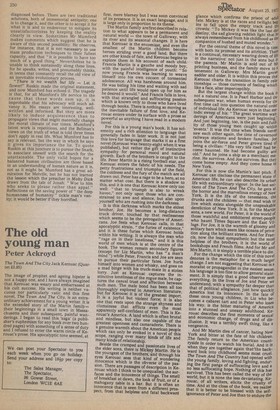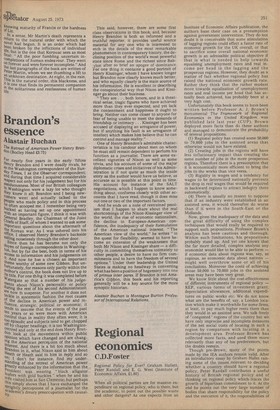The old young man
Peter Ackroyd
The Town And The City Jack Kerouac (Quartet 0.95)
The image of prophet and ageing hipster is not a happy one, and I have always imagined 'that Kerouac was weary and embarrassed at his cult success. His writing is neither vacuous nor particularly vatic and this first novel, The Town And The City, is an extraordinary achievement for a young writer. It is the extended story of the Martin family— their beginnings in a small town in Massachusetts and their subsequent, painful wanderings. I began to read this 'saga' (a publisher's euphemism for any book over two hundred pages) with something of a sense of duty 'and I refused to enter the warm circle of Kerouac's prose. His apocalyptic tone seemed, at
first, mere blarney but I was soon convinced of its presence. It is an exact language, and it is large only in proportion to its theme.
The Martin family are firstdescribed in relation to what appears to be a permanent and natural world — the town of Galloway, with its river and its seasonal changes. It is here that Kerouac is the encomiast, and even the smallest of the Martin children become heroes striding over a good land. But there are other kinds of fate, and Kerouac begins to explore them in his account of each child. Francis Martin is a gauche and moody boy, with the painful intelligence of youth: "So now young Francis was learning to weave himself into his own cocoon of tormented adolescence. All was harshness around him. He was biding his time and waiting with sad patience until life would open up for him as he desired it would." And Francis falls in love, with that strangled and suffocating passion which is known only to those who have lived through books. There is nothing so moving as the inevitable failure of first love, and Kerouac enters under its surface with a prose as powerful as anything I have read in a modern novel.
For this is a young man's book. It has sol-emnity and a rich attention to language that generally fades in later work. It is not just this love for language that marks it as a first novel (Kerouac was twenty-eight when it was published), but rather the gift of instinctive sympathy for personal mood and natural growth. Each of the brothers is caught to the life. Peter Martin is a rising football star, and Kerouac enters the fabric of his needs. The petty frustrations and triumphs of the field, the coldness and the fury of the match are all drawn out. Peter has a rage to be a hero, at no matter what cost. But there is a shadow to this, and it is one that Kerouac knew only too well: "that to triumph is also to wreak havoc," not only upon those who are constrained to awe and silence, but also upon yourself who are rushing into the darkness.
It is this darkness which marks the eldest brother, Joe. He becomes a long-distance truck driver, touched by that restlessness which seems to be the prerogative of Americans. Joe feels what Kerouac calls, in that apocalyptic strain, "the furies of existence," and it is these furies which Kerouac holds within his writing, It is always the men who rage on in their loneliness," and it is this world of men which is at the centre of the book. The women remain secondary figures (except for Liz Martin, who has "a man's mind ") while Peter, Francis and Joe are seen to pursue their particular fates. Joe hurls himself into women and whisky, and goes on a mad binge with his truck-mate in a stolen lorry. Just as Kerouac captures the instinctive loneliness of the rogue male, he captures the casual trust and affection between such men. The male bond has been all too thoroughly explored in American literature, but for Kerouac it is of the greatest import. It is a joyful but violent force; it is also one that rests upon the strange shyness and clumsiness that afflicts even the most apparently self-confident of men. This is Kerouac's America. A land which is often brutal and mindless, but also one capable of the greatest openness and camaraderie. There is a genuine warmth about the American people which can only be evoked in a novel of this scope, ranging over many kinds of life and many kinds of relationship.
Beside the cramped and passionate lives of the elder sons, there is Mickey Martin. He is the youngest of the brothers, and through his eyes Kerouac sees that kind of wondering innocence which is the obverse of the passion. There are passages of description in Kerouac which I think to be unequalled: the surfaces and the innocence of things. The smell of breakfast at dawn, the look of fruit, or of a mahogany table In a bar. But it is often an innocence that is seen from a different prospect, from that helpless and fatal backward
opectacor August 25, 1973 glance which confirms the prison of adult fate. Mickey is at the races and twilight be ins to fall upon the empty track and the crowds: "To Mickey it was like the last da‘ destiny, the sad glowing reddish light that he always remembered from his childhood as the companion of hushed and muted wonder."
For the central theme of this novel is time, with both its promise and its attrition. There is a continual, necessary wearing down of life in the narrative: not just in the sons but IP the parents. Mr Martin is sold out of his printing business, and the family move to 8 tenement in Galloway. Mrs Martin grows sadder and older. It is within this proces that Kerouac charts the transition in family rela' tionships — those currents of feeling which. like a face, alter imperceptibly.
But the largest change within the book is not a natural one. It is Pearl Harbor and the subsequent war, when human events for the first time call into question the natural order of individual life. As Kerouac says in that me' Iodic sweep of his: " The great wartime wall:, derings of Americans were just beginning: And just beginning, too, is the pain and _futility of those young men caught up withal 'events.' It was the time when friends never saw each other again, the time of cavernous railways stations and broken families. Joe joins the air-force and Peter grows tired of being a civilian: " His very life itself had become haunted. He had become guilty and old." And he joins a ship as a merchant ma' rifle. He survives. And Joe survives. But they come home empty. And they come home to New York,
For this is now the Martin's last pitch. if, Kerouac can disclose the permanent state or American life, he can also describe its urban life with extraordinary vigour. In the last sections of The Town And The City, he gets at the horror and the marvellous energy of New York. It is the life of the tenements, the drunks and the children — that mad wish to live which exists alongside the unspeakable dereliction of New York. It is, for the Martin sons, a new world. For Peter, it is the world of those watchful and embittered street-people who haunt Times Square and the East
Village. For Joe, it is the warmth of gloomy and solitary bars which seem like oceans of privation along the brilliant streets. And for Francis, now the least sympathetic but the most helpless of the brothers, it is the world of bookshops and French films. And for Mr and Mrs Martin, it is simply a terrible place to die.
For the change which the title of this novel denotes is the metaphor for a much larger change. I am not suggesting that Kerouac is a moralist or propagandist in the easiest sense, his language is too fine to allow general state ment. It is simply that a good observer sees everything. In the lives of Joe and Peter we understand, with a sympathy far deeper than that of political allegiance, just how quickly America lost its innocence. In the fate of these once young children, in Liz who becomes a cabaret tart and in Peter who loses his way, is the bitter maturing of America into a stunned and uneasy adulthood. Kerouac describes the first moments of sexua/ and economic change, of drugs and of disillusion. It was a terribly swift thing, like a vengeance,
And Mr Martin dies of cancer, hating New York and bitter at the fate of his children. The family return to the American countryside in order to watch his burial. And it is when they are together again thatlhe backward look into childhood seems most cruel. The Town And The Country had opened with the young family, loving and fighting, enduring the first pangs of suffocating love and a no less suffocating hope. Nothing of this has survived. This has been called the way of the world, but it is none the less devastating. Kerouac, of all writers, elicits the cruelty of time. And at the close of the book, we realise that it is better to be blessed with the self' ignorance of Peter and Joe than to endure the
knowing maturity of Francis or the hardness of Liz.
In a sense, Mr Martin's death represents a return to the natural order with which the novel had begun. It is an order which had been broken by the inflictions of individual life, but is the one that Kerouac sees as most "All the poor fumbling uncertain inc°n1Pletions of human endeavour. They went Oil forever and were forever incomplete." And the last paragraphs of the book are written of Peter Martin, whom we see thumbing a lift to an .unknown destination. At night, in the rain. This is the natural order, this blackness, and
is one that finds its permanent companion In the solitariness and restlessness of human



































 Previous page
Previous page